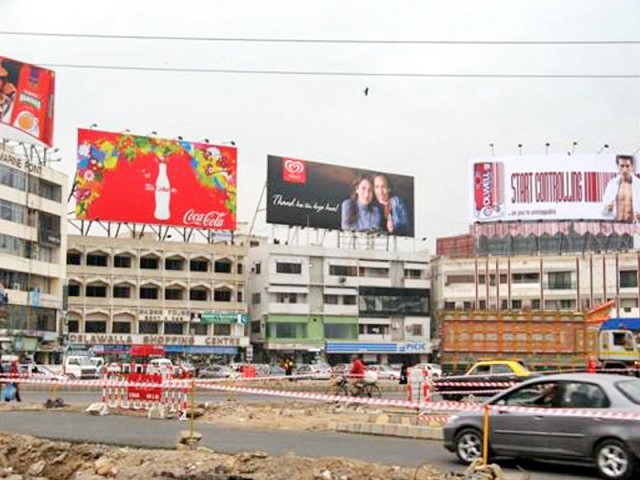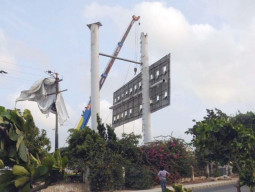
KARACHI:
The Supreme Court (SC) maintained on Thursday that there was no law that permits installing outdoor advertising billboards and signboards on 'public property' and ordered the Karachi Metropolitan Corporation (KMC), the Defence Housing Authority (DHA) and all the cantonment boards to remove these billboards/hoardings across the city by June 30.
The apex court also directed the additional attorney-general, Salman Talibuddin, and provincial advocate-general, Nisar Ahmed Durrani, to conduct meetings with all the civic agencies that grant permission for installing such outdoor advertisements to finalise the amendments to the proposed bylaws applicable beyond 'public properties' to achieve city-wide uniformity and ensure safety measures for citizens. The proposed meetings shall be attended by Durrani as well, while the additional attorney-general was ordered to report within one month.
On the clock: Cantonments to take down illegal billboards on Sharae Faisal
The stakeholders ordered to remove the illegal signboards include KMC, district municipal corporations (DMCs), DHA, all cantonment boards, Station Headquarters Corps 5, Karachi Commander Naval Headquarters and Civil Aviation Authority.
These directives were contained in the order issued after a three-member larger bench, headed by Justice Mian Saqib Nisar, heard the matter regarding outdoor display of commercial hoardings and billboards at the SC's Karachi registry. The other members were justices Amir Hani Muslim and Khilji Arif Hussain.
During Thursday's proceedings, Talibuddin placed before the court an interim report about a meeting held in the commissioner's office with the object to achieve city-wide uniformity for installation of the billboards. The report reflected that all the stakeholders, who attended the meetings, proposed amendments to the respective bylaws regarding the billboards' size, positioning and other issues.
Government's stance
The bench inquired from Durrani about the viewpoint of the Sindh government on the issue of the installation of billboards on public properties. On behalf of the government, Durrani said that no billboards or hoardings of any nature can be allowed to be installed on public properties. Talibuddin was also of the view that the hoardings cannot be installed on public properties.
No law permits billboard installation
The judges also heard Advocate Abdul Rehman, who was assisting the court as amicus curiae, the additional attorney-general, Sindh advocate-general and the administrators of district town committees.
"There is no law which permits KMC, [district municipal corporations] DMCs, cantonment boards or any other agency in Karachi to install billboards or hoardings on a public property," observed the bench in its order, adding that 'such an act on the part of [the] permission-granting agency is against the civil rights of the citizens'.
Conflicting claims : Installation of billboards sparks controversy
The apex court ordered that no billboard or hoarding can be permitted to be installed on any public property as a first step. "Therefore, all authorities are directed to immediately remove all the billboards/hoardings installed without permission within their jurisdiction within 15 days from today and report compliance," the bench ordered the KMC, DHA and the cantonments.
The bench further ordered that the hoardings, which have been installed in public properties under any licence or lease, shall be uprooted by June 30 by the advertising agencies concerned, which own the poles or displaying materials, or by the contractors, if they own such material, or by the authorities under whose permission the billboards have been installed.
Definitions
What is public property?
The judges explained in detail as to what type of property will come under the definition of 'public property'. The Supreme Court (SC) observed that the term 'public property' has wide meaning and, therefore, the judges clarified it in order to avoid any ambiguity. The term 'public property' shall include the following places:
1. Roads
2. Sidewalks
3. Islands in the centre of a road or service lane
4. Overhead bridges and underpasses
5. Overhead pedestrian walkways or bridges
6. Roundabouts
7. Green belts or dividers between a road
8. Pedestrian lanes
9. Nullahs (storm water drains) and the banks of nullahs
Published in The Express Tribune, May 6th, 2016.






















































COMMENTS (11)
Comments are moderated and generally will be posted if they are on-topic and not abusive.
For more information, please see our Comments FAQ